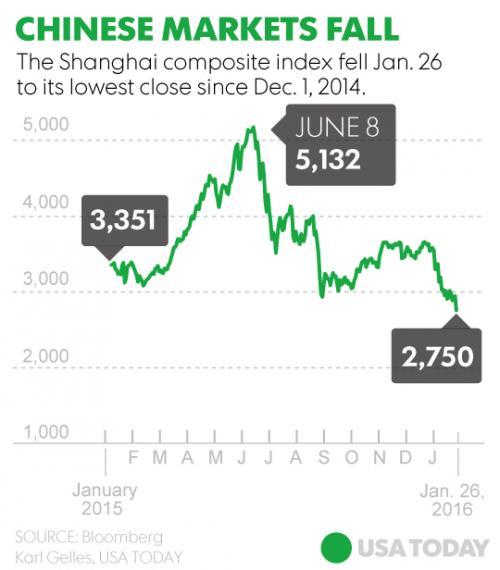China moves to lock down its financial system
Things are very different in China than they are in the United States. For instance, try to imagine this sentence referring to America's wealthy.
Though it has received far less attention, another more ominous sign of trouble is the "disappearance" of senior executives from at least 34 Chinese companies over the last year. On Jan. 7, billionaire Zhou Chengjian, the Chairman of Metersbonwe, one of China's leading clothing companies, vanished. The company issued a statement saying it was looking into reports that he had been picked up by the police.
Generally those billionaire CEOs show up again a few week later, but the situation is just one example of the stark contrast of our economies and political systems. Several hundred lawyers have also vanished, and are probably in police custody.
The reason for these senior executives going missing is a government crackdown on corruption (Hmmm. Maybe we could learn something from the Chinese).
The crackdown on corruption is all about regaining command control over the economy.
Before I go on, recall that China Does Capitalism Better Than America, according to many American capitalists.
Just a few months ago Bloomberg wrote, How China went from communist to capitalist. In 2013, the Cato Institute wrote How China Became Capitalist.
So keep that in mind while you read the rest of this.
China government is going to extraordinary lengths to regain control. Bloomberg gives us a list of these measures.
* Increased scrutiny of transfers overseas
* Curbing the offshore supply of yuan to make shorting costlier
* Restricting companies’ foreign-exchange purchases
* Suspension of foreign banks
* Outbound investment quotas frozen
* Delaying the Shenzhen stocks link
* UnionPay debit-card clampdown
* Underground banking clampdown
That's quite a list of restrictive measures. Surely that has had the desired effect, right? Right?
China’s capital outflows jumped in December, with the estimated 2015 total reaching $1 trillion, underscoring the scale of the battle facing policy makers trying to hold up the yuan amid slower economic growth and slumping stocks.
Outflows increased to $158.7 billion in December, the second-highest monthly outflow of the year after September’s $194.3 billion, according to estimates compiled by Bloomberg Intelligence. The total for the year soared more than seven times from $134.3 billion in the whole of 2014 to a record for Bloomberg Intelligence data dating back to 2006.
That's $1 Trillion, with a 'T', in a country that is still partly 3rd world.
So obviously those measures aren't working. Is the fix to simply allow the markets to work? More capitalism? Nope.
China’s government is stepping up efforts to ward off a potential financial crisis, warning bank executives that their jobs are on the line unless they control risks and putting restrictions on an increasingly popular way of evading capital controls.
It's funny to hear Wall Street bankers complain about how mean Obama has been for making bad words about them, even while Obama refuses to prosecute them for criminal behavior. Then compare this to China, which openly threatens them if they don't toe the line.
Anyway, here are the new measures started this week.
* banks would be forced to restructure, inject new capital or change their senior management if key risk indicators fall outside "reasonable ranges,"
* China’s central bank has told lenders it will require greater control over the amount of wealth management product funds they give to brokerages and other financial institutions to manage
* The central bank said Tuesday it will allow banks to cut the minimum required mortgage down payment to 20 percent from 25 percent for first-home purchases to the lowest level ever as it steps up support for the property market.
How we got here
China has an enormous problem of debts saturating their economy, particularly in their banking and real estate sectors, but the trigger for their latest financial problem is their stock market bubble bursting.

Most of China's wealth is wrapped up in real estate, rather than stocks. Which is why the latest move by the central bank to reduce minimum down payments is alarming by what it implies. However, this latest stock market bubble was a little different because of who participated.
The villagers first started investing their savings in stocks after hearing about the market craze on a visit to a nearby town. As the excitement spread, a small informal stock market center was set up in the village where residents could monitor their investments by the minute.
The farmers now only tend their fields outside of market hours, Liu noted.
When farmers prefer day trading over farming you have a problem. But it is even worse than that.
More than two thirds of new equity investors exited the education system by middle school — which in China means around the age of 15. More than 30 percent exited at age 12 or below.
The government responded to the bubble bursting by suspending IPO's, cutting interest rates repeatedly, creating a market stabilization fund, changed the rules to allow the national pension fund to buy stocks, the National Social Security Fund told its external fund managers they could buy stocks but were not permitted to sell them, allowed retail investors to use their apartments as collateral to buy stocks.
It still hasn't been enough to reinflate this bubble. All the carrots in the world haven't been enough to get people to buy more stocks, so now the Chinese government is resorting to the stick.


Comments
This sure does not sound good
I am so flabbergasted by this article that I don't know what to say.